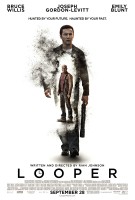 [amazon_link id=”B005LAII8K” target=”_blank” ]LOOPER[/amazon_link] Production Information
[amazon_link id=”B005LAII8K” target=”_blank” ]LOOPER[/amazon_link] Production Information
In the futuristic action thriller Looper, time travel will be invented – but it will be illegal and only available on the black market. When the mob wants to get rid of someone, they will send their target 30 years into the past, where a “looper” – a hired gun, like Joe (Joseph Gordon-Levitt) – is waiting to mop up. Joe is getting rich and life is good… until the day the mob decides to “close the loop,” sending back Joe’s future self (Bruce Willis) for assassination. The film is written and directed by Rian Johnson and also stars Emily Blunt, Paul Dano, and Jeff Daniels. Ram Bergman and James D. Stern produce.
TriStar Pictures, FilmDistrict, and Endgame Entertainment present in association with DMG Entertainment a Ram Bergman production, a film by Rian Johnson, Looper. The film stars Bruce Willis, Joseph Gordon-Levitt, Emily Blunt, Paul Dano, Noah Segan, Piper Perabo, and Jeff Daniels. Written and Directed by Rian Johnson. Produced by Ram Bergman and James D. Stern. Executive Producers are Douglas E. Hansen, Julie Goldstein, Peter Schlessel, Joseph Gordon-Levitt and Dan Mintz. Co-Producers are Dave Pomier, Eleanor Nett, Lucas Smith, and Christopher C. Chen. Director of Photography is Steve Yedlin. Production Designer is Ed Verreaux. Film Editor is Bob Ducsay. Costume Designer is Sharen Davis. Music by Nathan Johnson. Casting by Mary Vernieu, CSA.
Looper has been rated R by the Motion Picture Association of America for strong violence, language, some sexuality/nudity and drug content. The film will be released in theaters nationwide on September 28, 2012.
ABOUT THE FILM
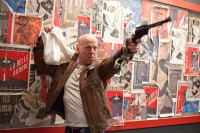 A hit man named Joe (Joseph Gordon-Levitt) discovers that his next target is his future self (Bruce Willis) in Looper, a mind-bending and time-bending thriller from writer-director Rian Johnson. The film takes place in 2044, when time travel doesn’t exist yet – but thirty years down the line, it will, and it will be controlled by gangsters for one purpose. As Gordon-Levitt explains, “The gangsters use time travel to kill people – they zap their victim back to the past, where a hit man called a Looper, employed by the future gangsters, assassinates them and disposes of the body.”
A hit man named Joe (Joseph Gordon-Levitt) discovers that his next target is his future self (Bruce Willis) in Looper, a mind-bending and time-bending thriller from writer-director Rian Johnson. The film takes place in 2044, when time travel doesn’t exist yet – but thirty years down the line, it will, and it will be controlled by gangsters for one purpose. As Gordon-Levitt explains, “The gangsters use time travel to kill people – they zap their victim back to the past, where a hit man called a Looper, employed by the future gangsters, assassinates them and disposes of the body.”
The trouble for Joe comes when he “lets his loop run,” says Willis. “Letting your loop run means that you’ve shown up to work, your older self has appeared in front of you, and – for whatever reason – you’ve let your older self escape. It doesn’t happen often, because if all goes correctly, your older self should have a sack over his head and be gagged and tied. You should just shoot him without knowing what you’re doing. But my character shows up in front of his younger self untied and no sack over his head. I get the drop on him and escape.”
Looper re-teams Gordon-Levitt with Johnson, who have remained good friends since filming the independent hit Brick some years ago. “Rian and I first met nearly ten years ago,” says Gordon-Levitt. “It wasn’t too long after we shot Brick that he started telling me about his idea for Looper, He ended up writing the lead character for me, which is the first time that’s ever happened to me as an actor, so to play that was a great honor.”
“When Joe and I first spoke about [amazon_link id=”B005LAII8A” target=”_blank” ]Looper[/amazon_link], just after we made Brick, it was just the premise of the movie,” says the writer-director. “What I liked about the idea was the predicament that Joe finds himself in – he knows what the future holds, and he has to make a moral choice about which way it’s going to go.”
Willis’s character is motivated by just how bad things have gone in the future. If the 2040s are a future where things are run down and everything has gone slightly wrong, the 2070s are marked by the change in control of the organized crime syndicates. “Everything is under the control of a guy called The Rainmaker,” says Willis. “He’s orchestrating mass executions – a reign of terror. But my character knows where the Rainmaker lives in Young Joe’s time. When I go back in time, I go on a mission to track down the Rainmaker and fix the future. Of course, nothing is as easy or as simple as it seems.”
Producer Ram Bergman – who previously produced Johnson’s first two films, Brick and The Brothers Bloom – says that working with a writer-director like Johnson is a rare treat. “He’s just so talented, unique, and nice,” says Bergman. “The dynamic is that Rian tells me an idea and then he goes and develops it. We go back and forth on a few drafts, and when we feel like the draft is ready to go, we figure out how to make the movie – and to make it in a way that Rian can do it the way he wants to do it. It’s our job to support his vision and help him make it a reality.”
Producer James D. Stern also re-teams with Johnson, after joining with Bergman to produce Johnson’s The Brothers Bloom. “Rian is a singular voice. That’s what makes him so special. He always maintains a unique take on the world he’s creating and doesn’t sacrifice what he wants to accomplish,” says producer James D. Stern. “People know the real thing when they see it, and that conversation between artist and audience is critical. When I first read Looper, I was not only eager about the prospect of working with Rian again (as well as Ram), but also thrilled to jump into a film that not only has so many twists and turns, but also is so rich with layers and meaning.”
In creating the time-travel story, Johnson kept things simple. “You get put into the machine in the 2070s and you get sent back – bang! – thirty years to a predetermined site,” he explains. “The time machine is set at a fixed interval – you can’t dial it up or down,” says Johnson. “So as time keeps going forward in 2074, the point a person is going to be sent back to the 2040s keeps sliding forward as well.”
Johnson also set up a world in which time travel has been outlawed, so it isn’t necessarily fully understood or researched – the only thing the mobsters know is that it works. In fact, “The smartest men in the future know one thing: they know to be scared to death of it,” says Johnson. “That’s part of the reason it was outlawed – grandfather paradoxes, butterfly effects… nobody really knows what would happen. All they know is that it’s incredibly dangerous and they shouldn’t be messing with it, and even the mob will only mess with it in this one particular way. That’s one of the reasons why it’s so important that loops sent to be closed get closed: this person from the future is now loose. Who knows what the consequences could be.”
“The movie was completely in Rian’s head,” says Stern. “He knows exactly how he wants to cut the film, how he wants the film to look. He knows every shot, every day. When I came to New Orleans, where we shot the movie, every single person in the production office had a book with all the storyboards. Every single person knew every single shot in the movie. It was amazing, and it’s a real tribute to Rian.”
At the center of the film are the Loopers – the low-level hit men assigned to rub out the victims of the future mob. “Loopers are not the most forward-thinking guys,” says Gordon-Levitt. “Your victim appears out of nowhere, hogtied, and you just have to shoot him. All it takes is the willingness to risk your life, because eventually, the future gangsters will ‘close your loop’ and send your future self to be your next victim.
The Loopers’ weapon of choice is the Blunderbuss. “It’s designed for what a Looper does, which is to shoot a hogtied man from ten feet away,” says Gordon-Levitt. “It doesn’t have any range or accuracy – you can’t hit anything far away, but you also can’t miss anything if it’s close.”
“The Blunderbuss is an awful gun,” says Johnson. “It’s basically a metal tube that can cough out a couple of shots. But if a guy shows up in front of you, hogtied, with a sack over his head, and you’ve got to kill him, it’s the gun that’s made for the job.”
“The Loopers aren’t really good killers – they’re more like technicians,” says Paul Dano, who plays one of Joe’s fellow Loopers. “The mob has made it as simple as possible – like working in a factory line where all you do is pull a lever.”
Compare these low-level gangsters with the more talented Gat Men – trained killers with better weapons to show for it. “Gat men are the muscle for the main mob in the present day,” says Johnson. “If the Loopers are the low men on the totem pole, the gat men are the real muscle that run the city. Gat men have these huge, very accurate revolvers – precision weapons. They’re very easy to clear if they jam – they’re big, imposing guns that you do not want to mess with.”
CASTING THE FILM
In the film, Joe, played by Joseph Gordon-Levitt, is a “looper” – a hit man for the mob. When future gangsters want to rub somebody out, they send the target back in time, where Joe is waiting to do him in. After all, what better place to hide a body than in the past? It’s all a big party for Joe until the day comes when the mob decides to “close his loop” – that is, send his future self back for assassination.
Meanwhile, in 2074, Old Joe (Bruce Willis) has seen the years and the mileage. But when the new gangsters in town try to “close his loop,” he will take matters into his own hands. He gives his younger self the slip – that is, Young Joe “lets his loop run” – and now, Old Joe is on the run from his past self and trying to change his future.
As the movie calls for an older and a younger version of the same character, there was an interesting casting challenge for the filmmakers. Rather than seek out two actors who naturally look alike, they instead sought out the best actors for the roles – and let the chips fall where they may. “I had written the younger part for Joseph Gordon-Levitt, who, besides being my favorite actor, is also a good friend and we wanted to work with each other again,” says Johnson. “When the possibility of Bruce Willis to play the older Joe presented itself, I got so excited because Bruce is such a good actor and was so right for the part in so many ways. It raised a problem, though, because they really look nothing like each other. We had to find a way to bridge the gap, and the solution was two-fold.
“The first thing was makeup,” Johnson continues. “Joseph Gordon-Levitt went through nearly three hours of makeup and prosthetics every single morning to adjust his nose, his upper lip and his lower lip. There was no way we were going to make him look like a young Bruce Willis, but we decided we’d pick a couple of key features and alter them just enough to give the audience something to grab onto so they could decide to go with it.”
“I had the pleasure of working with Kazuhiro Tsuji, who is arguably the best special effects makeup designer in the world,” says Gordon-Levitt. “He’s a magician. You can’t tell that there’s make-up at all, but I spent three hours in the makeup chair every morning getting a nose, lips, eyebrows, ears, and contact lenses. We were never going to be able to make me look exactly like Bruce Willis, because we just look completely different, but I think we did enough that the audience doesn’t have to think about it – they just have to feel, ‘Yep, that character is the same guy as that other character, 30 years later.’”
But makeup was just part of the story. “The other part – 90 percent of it – is Joe’s performance,” says Johnson. “It’s incredible to watch – he doesn’t imitate Bruce, he creates a character that feels like a younger Bruce. He’s doing a very specific voice and he took on a lot of Bruce’s mannerisms. It’s great acting, and a pretty phenomenal thing to see come to life.”
“I didn’t want to do a Bruce Willis impersonation – that’s not really my forte. I wanted to create a character that felt like it could be a younger version of this guy – just give it a bit of that Willis flavor,” says Gordon-Levitt. “Bruce is a really understated guy, so to see him to a little double-take when he looked at me was really thrilling. At one point, he said, ‘Man, you sound like me.’ I tried to play it cool – ‘Oh, thanks, dude’ – but inside, I was thinking, ‘YEAH!’”
Willis says that he was impressed by Gordon-Levitt’s performance. In one scene, he says, “I was sitting across from Joe across a table. I was supposed to act and get all my lines right, but I just found myself looking at him and thinking how weird it was,” he says. “It’s really a strange thing to see someone that looks like a young version of yourself. He’s a great actor –I love his work and I just love what he did in this film. He picked up some of my cadence of speaking, which was odd, and yet, really cool at the same time.”
“That scene was so much fun to shoot,” says Johnson. “You have these two great actors sitting across a table, bantering back and forth, and that’s always fun to watch. It was more than halfway through production when we shot that scene – we had mostly been working with Joe and Bruce separately – so to see them sit across from each other was exciting.”
Emily Blunt plays Sara, a young mother living in a farmhouse outside of the city who will play a key role when Young Joe takes refuge on her property. Hunted by the mob after letting his loop run, and formulating a plan to try to close his loop, Sarah will play a pivotal role in determining which way the future turns out.
“When Joe – this hired killer – shows up and he’s obviously got an agenda, Sara is obviously very dubious about him,” says Johnson. “It’s only slowly, over the course of the second half of the movie, that she sees that he’s trying to figure out what the right thing to do is, that she begins to trust him.”
In the film, Sara has a skill that will play an important role in the future – even if it’s only a parlor trick in the movie’s present. “She’s what they call ‘TK’ – she has telekinetic abilities,” says Blunt. “In the movie, people have them to varying degrees of power. Her powers are greater than some, but nothing compared to other characters in the movie.”
Johnson says that the telekinesis power he presents in the film maybe isn’t as exciting as we might imagine. “TK began as a genetic mutation – everybody got really excited about it, it was on the cover of all the magazines, and then everyone realized it was just a pretty weak thing where all you can do is float something about the size of a quarter,” says Johnson. “It went from ‘We’re going to have superheroes!’ to a parlor trick that people can do in bars. Sara has this power, but she’s a little better at it than everybody else – and that might be part of the reason why she’s removed herself and her son from the city.”
Sara lives in a farmhouse outside of the city, where she is trying to raise her son. “Her relationship with her son, Cid, is strained,” she says. “He doesn’t call her Mom – he calls her Sara, which is just a stab in the heart to her every time he does it. She’s trying to establish a connection with him and nurture him, and he’s putting the stoppers on it at every turn.”
Paul Dano takes on the role of Seth, a fellow Looper whose loop is closed in a particularly messy way. “He’s kind of a loner type – maybe a guy who doesn’t totally fit in with some of the other guys –but he latches on to Joe,” he says. “When he lets his loop run… I don’t think he has a particular reason. His older self is singing a song that evokes a childhood memory, and he’s hit with a rush of emotion. Time sort of stands still for him. I don’t think he can explain why it happens.”
Noah Segan plays Kid Blue, Abe’s lead gat man. “He’s a gangster and a killer, but I don’t think he’s a psychopath,” says Segan. “He’s a guy who is determined to accomplish what he sees as his job at any cost. He’s honed his skills, and he’s going to stay on track and hang on to that.”
For the role of Suzie, Johnson cast Piper Perabo. “Suzie works in a dance hall, and sees clients in the back,” she says. “Loopers are not their best clients – they’re not even allowed in the club on some nights – but she does see Joe occasionally and they have a strange relationship. He’s a pretty good guy, compared with the other killers that she sleeps with. There’s a kindness to him that allows her to catch her breath for a minute.”
Rounding out the cast of the film is Jeff Daniels as Abe, the crime boss in the present day. “The city is run by this small-time mobster named Abe – he’s kind of become a bit of a father figure to Joe. He’s got his gang of gat men and he runs the city. The thing is, Abe is actually from the future,” Johnson explains. “He was sent back to run the Loopers and keep them in line. He got bored, so he formed a little gang, and now, he runs the city.”
“No one expects Jeff Daniels to play the heavy,” says Bergman. “Even one of our casting people was surprised that Rian wanted him for the part. But he’s great – he knocked it out of the park.”
ABOUT THE PRODUCTION
For the look of the film, Johnson turned to director of photography Steve Yedlin and production designer Ed Verreaux. The film is set in the near future – a choice that allowed Johnson to thread the needle between science fiction and grounded reality. “I wanted it to be set far enough in the future that we could do a couple of fun things, but not so far ahead that we couldn’t have a grounded world that you recognized,” he explains.
“The future is a pretty bleak place,” Johnson continues. “Everything is a bit broken down; people are still driving cars from 2010 that they have had to keep up for 30 years.”
“The description that Rian likes to use is ‘theatrical realism,’” says Yedlin. “That sounds like an outright contradiction, but because Rian and I have worked together for so long and talked about it, it really did mean something specific – the lighting, the feel of the sources, it’s all based on something realistic but it’s theatrically heightened.”
“We didn’t want a completely destroyed future or a completely shiny and wonderful future, either,” says Verreaux, the production designer. “It’s a future where things didn’t go well – the economy fell apart, major manufacturing stopped. That’s why all the cars in our movie are 30 years old; there are a few special new cars for the uber-wealthy, but everyone else is driving old cars.
“The idea was that the look was derived from sociopolitical change, rather than technological change,” Yedlin explains.
“We always knew that it wasn’t going to be ‘Tron,’” says Stern. “We were going to a kind of retro-future, and also a future that’s been tagged with a bit of urban blight. The slat bike is a perfect example – it could be a World War II motorcycle, but it’s also futuristic, which gives it a unique look.”
Even with that, though, Johnson took a decidedly low-tech approach. “Rian likes to do everything in-camera, practically, that he possibly can,” he says. “There are a few CG background elements, but most of the CG in the film is wire removal, rather than adding elements. Even for the slat bike, we put a real bike on a rod, with the rod connected to a truck – we’d just paint out the rod.”
As for the design of the time machine itself, Johnson and Verreaux looked to history. “Rian showed me a picture of the very first atomic bomb, which was called ‘The Gadget,’” says Verreaux. The bomb has a retro-futuristic design, a tangled mess of wires and cables and boxes surrounding a large sphere. “As soon as I saw that, I knew what I needed to do. We went for a retro, simplified, down-and-dirty look. The important thing is to get across the idea that the time machine works – beyond that, it’s more important to focus on the narrative of the movie.”
“It was important that the time machine look pieced together, like it didn’t cost a lot of money to make it,” says Bergman. “It’s not glossy, it’s junky. They’ve just barely been able to make it work – that’s all.”
Most of the film was shot in New Orleans, but for two weeks, the film also shot on location in China. “Originally, when I wrote the screenplay, the sequence was set in Paris. We were going to fake it in New Orleans – not ideal, but something you can pull off with movie magic,” says Johnson. “But then, our Chinese distributor made us an offer: what if we could shoot some of this in Shanghai? And the more I thought about it, the more sense it made for the story – Joe romanticizes Paris, but China is a place that a young man would go to in the future. Not only that, but it’s fun – instead of faking Paris, we got a real Shanghai. It was a no-brainer.”
Endgame Entertainment brought in the Chinese distributor, DMG Entertainment, to be a partner on the film. Seeing the emerging market of China, they saw the opportunity be ahead of the curve and present a futuristic vision of the country in the film. “It worked because it completely made sense for the story Rian was telling,” says Stern. “We had a chance, both in the movie and behind the scenes, to break new ground and to show something that has never been seen before – even in China.”
A LOOPER GLOSSARY
Looper: A low level assassin who works for a mob in the future, killing targets they send back and disposing of the bodies.
Gat Man: A higher level gangster, the Gat men work locally with more typical thug responsibilities. They tend to look down on Loopers as a lot of untrained dandies.
Blunderbuss: A short stout hand cannon used by Loopers. Powerful but with a wide spread – impossible to hit anything more than 10 yards away, impossible to miss anything closer.
Gat: Generic term for a gun, but colloquial name for the Gat Men’s high caliber revolver. Powerful, accurate and reliable.
TK: Short for “telekinetic.” By 2040 a very low grade telekenetic power has developed in about 15% of the general population. Far from being a superpower, it’s weak and short range, and mostly used for bar tricks.
Closing Your Loop: A stipulation in every Looper’s contract that he may some day be required to kill his future self, thus closing his contract, getting a huge pay-off and erasing any trace of the very illegal arrangement with his future employer.
ABOUT THE CAST
 BRUCE WILLIS (Old Joe) has demonstrated incredible versatility in a career that has included such diverse characterizations as the prizefighter in Quentin Tarantino’s Pulp Fiction (1994 Palme D’Or winner at Cannes), the philandering contractor in Robert Benton’s Nobody’s Fool, the heroic time traveler in Terry Gilliam’s 12 Monkeys, the traumatized Vietnam veteran in Norman Jewison’s In Country, the compassionate child psychologist in M. Night Shyamalan’s Oscar®-nominated The Sixth Sense (for which he won the People’s Choice Award) and his signature role, Detective John McClane, in the Die Hard quadrilogy.
BRUCE WILLIS (Old Joe) has demonstrated incredible versatility in a career that has included such diverse characterizations as the prizefighter in Quentin Tarantino’s Pulp Fiction (1994 Palme D’Or winner at Cannes), the philandering contractor in Robert Benton’s Nobody’s Fool, the heroic time traveler in Terry Gilliam’s 12 Monkeys, the traumatized Vietnam veteran in Norman Jewison’s In Country, the compassionate child psychologist in M. Night Shyamalan’s Oscar®-nominated The Sixth Sense (for which he won the People’s Choice Award) and his signature role, Detective John McClane, in the Die Hard quadrilogy.
Following studies at Montclair State College’s prestigious theater program, the New Jersey native honed his craft in several stage plays and countless television commercials, before landing the leading role in Sam Shepard’s 1984 stage drama “Fool for Love,” a run which lasted for 100 performances off-Broadway.
Willis next won international stardom and several acting awards, including Emmy and Golden Globe honors, for his starring role as private eye David Addison in the hit TV series “Moonlighting,” winning the role over 3,000 other contenders. At the same time, He made his motion picture debut opposite Kim Basinger in Blake Edwards’ romantic comedy Blind Date.
In 1988, he originated the role of John McClane in the blockbuster film, Die Hard, one of the highest-grossing releases of the year. He later reprised the character in three sequels – Die Hard: Die Harder (1990), Die Hard: With A Vengeance (1995’s global box-office champ) and Live Free or Die Hard (one of the box-office hits of summer 2007)
His wide array of film roles includes collaborations with such respected filmmakers as Michael Bay (Armageddon), M. Night Shyamalan (The Sixth Sense and Unbreakable), Alan Rudolph (Mortal Thoughts, Breakfast of Champions), Walter Hill (Last Man Standing), Robert Benton (Billy Bathgate, Nobody’s Fool,), Rob Reiner (The Story of Us), Ed Zwick (The Siege), Luc Besson (The Fifth Element), Barry Levinson (Bandits, What Just Happened), Robert Zemeckis (Death Becomes Her) and Robert Rodriguez (Sin City, Grind House) .
Other motion picture credits include The Jackal, Mercury Rising, Hart’s War, The Whole Nine Yards (and its sequel The Whole Ten Yards), The Kid, Tears of the Sun, Hostage, 16 Blocks, Alpha Dog, Lucky Number Slevin and Perfect Stranger. He also voiced the character of the wise-cracking infant, Mikey, in Look Who’s Talking and Look Who’s Talking Too as well as the lead character RJ & Spike in the animated hit features Over the Hedge and Rugrats Go Wild!
Willis, who was last seen in the Golden Globe nominated feature film RED opposite Helen Mirren, Morgan Freeman and John Malkovich, is currently starring on the big screen in Wes Anderson’s critically acclaimed feature Moonrise Kingdom as well as the number one box office hit Expendables 2. Willis recently wrapped production on A Good Day to Die Hard (the fifth installment in the popular Die Hard franchise) and will soon begin lensing on RED 2.
In addition to his work before the cameras, Willis produced Hostage and The Whole Nine Yards and executive produced Breakfast of Champions, adapted from Kurt Vonnegut’s best-selling novel. With brother David Willis and business partner Stephen Eads, he co-founded Willis Brothers Films, a film production company based in Los Angeles.
Willis also maintains a hand in the theater. In 1997, he co-founded A Company of Fools, a non-profit theater troupe committed to developing and sustaining stage work in the Wood River Valley of Idaho, and throughout the U.S. He starred in and directed a staging of Sam Shepard’s dark comedy True West at the Liberty Theater in Hailey, Idaho. The play, which depicts the troubled relationship between two brothers, was aired on Showtime and dedicated to Willis’ late brother Robert.
An accomplished musician as well, Willis recorded the 1986 Motown album “The Return of Bruno,” which went platinum and contained the No. 5 Billboard hit “Respect Yourself.” Three years later, he recorded a second album “If It Don’t Kill You, It Just Makes You Stronger.” In 2002, he launched a U.S. club tour with his musical group, Bruce Willis and the Blues Band and he traveled to Iraq to play for U.S. service men.
 JOSEPH GORDON-LEVITT (Joe) can currently be seen starring in The Dark Knight Rises, Christopher Nolan’s third and final installment in the Batman series. He may also be seen in Premium Rush for director David Koepp, and later this year, he will be seen in Steven Spielberg’s Lincoln, in which he will star as Robert Todd Lincoln opposite Daniel Day Lewis’s Abraham Lincoln. He recently wrapped his feature film directorial debut, Don Jon’s Addiction, from a script he wrote and in which he stars opposite Scarlett Johansson and Julianne Moore.
JOSEPH GORDON-LEVITT (Joe) can currently be seen starring in The Dark Knight Rises, Christopher Nolan’s third and final installment in the Batman series. He may also be seen in Premium Rush for director David Koepp, and later this year, he will be seen in Steven Spielberg’s Lincoln, in which he will star as Robert Todd Lincoln opposite Daniel Day Lewis’s Abraham Lincoln. He recently wrapped his feature film directorial debut, Don Jon’s Addiction, from a script he wrote and in which he stars opposite Scarlett Johansson and Julianne Moore.
Gordon-Levitt’s additional film credits include 50/50, directed by Jonathan Levine and also starring Seth Rogen, Anna Kendrick and Bryce Dallas Howard, for which he received a Golden Globe nomination; Christopher Nolan’s Academy Award®-nominated action-drama Inception, also starring Leonardo DiCaprio, Marion Cotiallard and Ellen Page; Hesher, directed by Spencer Susser with Natalie Portman and Rainn Wilson (Sundance Film Festival 2010); Marc Webb’s (500) Days of Summer, also starring Zooey Deschanel, for which he received Golden Globe, Independent Spirit Award and People’s Choice Award nominations; the global action hit G.I. Joe: The Rise of Cobra for director Stephen Sommers; Spike Lee’s World War II drama Miracle at St. Anna; the controversial drama Stop-Loss, in which he starred with Ryan Phillippe under the direction of Kimberly Peirce; and the crime drama The Lookout, which marked Scott Frank’s directorial debut. In addition, Gordon-Levitt has received widespread praise for his performances in such independent features as John Madden’s Killshot with Diane Lane and Mickey Rourke; Lee Daniels’ Shadowboxer; Rian Johnson’s award-winning debut film, Brick; Mysterious Skin for writer/director Gregg Araki; and Manic with Don Cheadle.
Early in his career, Gordon-Levitt won a Young Artist Award for his first major role, in Robert Redford’s drama A River Runs Through It. He went on to co-star in Angels in the Outfield, The Juror, Halloween H20 and 10 Things I Hate About You.
Gordon-Levitt is also well known to television audiences for his starring role on NBC’s award-winning comedy series “3rd Rock from the Sun.” During his six seasons on the show, he won two YoungStar Awards and also shared in three Screen Actors Guild Award® nominations for Outstanding Performance by a Comedy Series Ensemble. Following the series, Gordon-Levitt took a short break from acting to attend Columbia University.
Gordon-Levitt founded and directs an open collaborative production company called HITRECORD.ORG comprised of an online community of thousands of artists from all over the world. Time magazine wrote that hitRECord “has blossomed into a full-blown hive-mind of creativity. With more than 40,000 participants working together to create short films, music, art or stories, hitRECord offers a creative opportunity for fresh talent to team together and expose their art.”
The company has presented evenings of short film and live entertainment at the Sundance and South by Southwest Film Festivals, toured some of the country’s top colleges, published the Tiny Book of Tiny Stories (which was released by Harper Collins in December 2011) and released a DVD/book/CD called “RECollection volume 1” last Fall. A budding writer/director in the more traditional sense, as well, Gordon-Levitt adapted the Elmore Leonard short story “Sparks” into a 24-minute short film that screened at Sundance 2009.
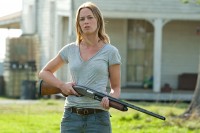 EMILY BLUNT (Sara) shot to international prominence with her lead role in the multi award-winning British movie, My Summer of Love. For her performance, Blunt won the Most Promising Newcomer award at the 2004 Evening Standard Film Awards, was nominated in the Best Newcomer category at the 2004 British Independent Film Awards and the film won the Best British Film award at the 2005 BAFTAs.
EMILY BLUNT (Sara) shot to international prominence with her lead role in the multi award-winning British movie, My Summer of Love. For her performance, Blunt won the Most Promising Newcomer award at the 2004 Evening Standard Film Awards, was nominated in the Best Newcomer category at the 2004 British Independent Film Awards and the film won the Best British Film award at the 2005 BAFTAs.
Blunt started her career at the 2002 Chichester Festival, where she played Juliet in a production of “Romeo and Juliet.” Her London stage debut was portraying Gwen Cavendish in a production of “The Royal Family,” opposite Dame Judi Dench. In 2003, she appeared on TV screens as Princess Isolda in the British television drama “Boudica” and in the same year she starred in the television adaptation of Agatha Christie’s “Death on the Nile.” Blunt went on to appear in “Henry VIII,” a two-part television drama documenting the stormy 38-year reign of the king. Blunt played Henry’s fifth wife, the teenage Queen Catherine Howard, alongside Ray Winstone, Helena Bonham-Carter and Michael Gambon. The series won the Best TV Movie at the 2003 International Emmy Awards
The critically acclaimed Gideon’s Daughter, in which Blunt starred alongside Bill Nighy and Miranda Richardson, was shot in October 2004. The film was first broadcast on BBC ONE in February 2006 and appeared on BBC America in April of the same year. Emily won a Golden Globe for Best Supporting Actress in Television at the 2007 Awards for her performance.
Also in 2006, Blunt starred in The Devil Wears Prada. An adaptation of the hugely-popular Lauren Weisberger novel, the film features Emily as the intensely neurotic Emily Charlton, senior assistant at Runway Magazine, who is permanently on the verge of a nervous breakdown. Directed by David Frankel and co-starring Anne Hathaway and Meryl Streep and Stanley Tucci, the film opened to great acclaim in the US in June 2006 and made over $125 million at the US box office and over $320 million worldwide. For her performance, Blunt was nominated in the Breakthrough Female category at the 2006 Teen Choice Awards for her performance and was honored with the Breakthrough Award at the 2006 Movieline Young Hollywood Awards. She was also nominated in the Best Supporting Actress category at the Golden Globes and the BAFTAs for the role. She was later nominated for the Rising Star Award at the 2007 BAFTAs.
In August 2006, Blunt started work on The Great Buck Howard. Written and directed by Sean McGinly and co-starring Tom Hanks, John Malkovich and Colin Hanks, the film premiered at the 2008 Sundance Film Festival and was released in the US in March 2009. Following this, Emily filmed Dan in Real Life, with Steve Carell, Juliette Binoche and Dane Cook. It was released in the US in October 2007 and in the UK in January 2008.
Blunt went on to make The Jane Austen Book Club, starring alongside Maria Bello, Frances McDormand, Kevin Zegers and Hugh Dancy, which was released in the fall of 2007.
Blunt next spent two months in Albuquerque, New Mexico filming Sunshine Cleaning. Produced by the team behind Little Miss Sunshine, the film is directed by Christine Jeffs, which premiered at the 2008 Sundance Film Festival and saw a successful release in March 2009. Blunt was nominated for a Critic’s Choice Award for Best Supporting Actress for the role.
Blunt was next seen in Mike Nichols’s Charlie Wilson’s War with Tom Hanks, Julia Roberts and Philip Seymour Hoffman. The film was released in the US in December 2007.
Blunt next filmed the Martin Scorsese-produced biopic, The Young Victoria. Written by Julian Fellowes and directed by Jean-Marc Vallee, and also starring Miranda Richardson, Jim Broadbent and Rupert Friend, the film was released in the UK in March 2009. The film was then picked to be the closing night film of the 2009 Toronto Film Festival, ahead of a January 2010 release. Blunt was nominated in the category of Best Actress at the 2010 Golden Globe Awards and also in the same category at the Critic’s Choice Awards for her performance.
In February 2010, Blunt was seen in The Wolfman, directed by Joe Johnston, opposite Benicio del Toro and Anthony Hopkins. Also in February 2010, Blunt voiced the female lead role of Juliet in Disney’s 3D animation Gnomeo and Juliet, with James McAvoy voicing Gnomeo. Directed by Kelly Asbury, the film’s soundtrack is written and produced by Elton John.
In December 2010, Blunt was seen playing Princess Lilliputia in the retelling of Jonathan Swift’s iconic novel Gulliver’s Travels, starring alongside Jack Black and Jason Segel.
In March 2011, Emily appeared in the thriller The Adjustment Bureau, directed by George Nolfi. Later that year, Blunt took a cameo role in Disney’s The Muppets.
Next, Blunt starred alongside Ewan McGregor, Kristin Scott Thomas and Amr Waked in Lasse Hallstrom’s Salmon Fishing in the Yemen. The film premiered at Toronto Film Festival in 2011 and went on to become the biggest sale of the festival.
Earlier this year, Blunt played the female lead in the Universal Pictures comedy Five Year-Engagement in which she starred alongside Jason Segel, Alison Brie, Rhys Ifans and Chris Pratt. The film was directed by Nicholas Stoller and co-written by Nicholas and Jason Segel. She also starred in Your Sister’s Sister, directed by Lynn Shelton. The film co-stars Rosemarie Dewitt and Mark Duplass and became one of the surprise stand-outs of the 2011 Toronto Film Festival.
In September, Blunt begins production on Doug Liman’s All You Need Is Kill alongside Tom Cruise.
PAUL DANO (Seth) is currently in the midst of a long period of wildly varied, challenging work.
Dano reteams with Little Miss Sunshine’s Jonathan Dayton and Valerie Faris for the current, critically acclaimed He Loves Me (Fox Searchlight), written by and co-starring Zoe Kazan. Dano plays a successful novelist struggling with writer’s block who finds romance in a most unusual way: by creating a female character he thinks will love him, then willing her into existence.
Dano most recently received acclaim at this year’s Sundance Film Festival for his performance as an aspiring rock star and young father in So Yong Kim’s For Ellen, which Tribeca Films will release on September 5.
Dano served as an executive producer on both films.
This spring, Dano starred opposite Robert De Niro in Being Flynn (Focus Features), Paul Weitz’s adaptation of Nick Flynn’s celebrated memoir Another Bullshit Night in Suck City.
In addition, Dano recently completed work on Steve McQueen’s TWELVE YEARS A SLAVE (New Regency), the screen version of Solomon Northup’s novel about a free black man who, promised a job playing violin in the circus, is drugged and dragged to Louisiana and sold into slavery. The cast also includes Chiwetel Ejiofor, Michael Fassbender, Brad Pitt and Adepero Oduye.
For his work opposite Brian Cox in Michael Cuesta’s L.I.E., Dano earned an Independent Spirit Award for Best Debut Performance. For Little Miss Sunshine, he garnered a second Spirit Award nomination, a Broadcast Film Critics Association Award for Best Young Actor and a Screen Actors Guild Award (ensemble) with cast mates Alan Arkin, Abigail Breslin, Steve Carell, Toni Collette and Greg Kinnear.
The following year, Dano earned a BAFTA Award nomination for Best Supporting Actor opposite Academy Award®-winner Daniel Day-Lewis in Paul Thomas Anderson’s There Will Be Blood.
Dano’s film credits also include Kelly Reichardt’s Meek’s Cutoff, Jon Favreau’s Cowboys & Aliens, Spike Jonze’s Where the Wild Things Are (as the goat-like Alexander), James Mangold’s Knight and Day, Dagur Kári’s The Good Heart with Cox, Matt Aselton’s Gigantic (which marked his first executive producer credit), Ang Lee’s Taking Woodstock, Richard Linklater’s Fast Food Nation, James Marsh’s The King, Rebecca Miller’s The Ballad of Jack and Rose with Day-Lewis, D.J. Caruso’s Taking Lives, Luke Greenfield’s The Girl Next Door, Michael Hoffman’s The Emperor’s Club and Shari Springer Berman and Robert Pulcini’s The Extra Man, both with Kevin Kline.
Growing up in Manhattan and Connecticut, Dano began his career on the New York stage with roles in Broadway productions of “Inherit the Wind,” opposite George C. Scott and Charles Durning and “A Christmas Carol,” with Ben Vereen and Terrence Mann. He returned to the stage in 2007 in The New Group’s off-Broadway production of Jonathan Marc Sherman’s “Things We Want,” directed by Ethan Hawke and starring Peter Dinklage, Josh Hamilton, and Zoe Kazan. In late 2010, he appeared with Jeffrey Wright and Mos in the world premiere of John Guare’s “A Free Man of Color,” directed by George C. Wolfe at Lincoln Center Theatre.
NOAH SEGAN (Kid Blue) was born in Brooklyn, New York and currently resides in Hollywood, California. Segan spent much of his youth traveling, educating himself in the disciplines of photography, music and acting. The later has led to myriad roles, garnering him a unique and respectable resume amongst independent filmmakers and fans.
With Looper, Segan reunites with filmmaker Rian Johnson and star Joseph Gordon-Levitt, with whom he worked on his first film, Brick. Beginning with his supporting role in that film, the characters Segan embodies continue to be as wide-ranging and varied as the films themselves. Segan’s credits include studio productions, such as starring in Lionsgate’s Cabin Fever: Spring Fever, Fox’s The Visitation, and a featured cameo in Johnson’s The Brothers Bloom, opposite Mark Ruffalo. In independent cinema, Segan has starred in What We Do Is Secret, opposite Shane West and Bijou Philips, a biopic about the life and times of seminal, legendary punk band The Germs. His lead performance in Deadgirl, opposite Shiloh Fernandez, from the producer of Heathers, resulted in Segan winning multiple awards after a prestigious premiere at The Toronto International Film Festival. Other independent credits include starring in and producing Chad Ferrin’s 1970s-inspired grind-house throwback Someone’s Knocking At The Door and Chain Letter, from the producers of the Saw franchise.
Golden Globe nominee PIPER PERABO (Suzie) stars as Annie Walker on USA Network’s spy drama, “Covert Affairs.” The show is produced by The Bourne Identity’s Doug Liman and is an action packed show filled with drama and sex appeal. “Covert Affairs,” which returned this summer for its third season, airs on Tuesdays at 10/9c on USA. Recently, Perabo wrapped up filming the thriller Red Machine, directed by David Hackl. She will be starring alongside Billy Bob Thornton, Thomas Jane and James Marsden.
Perabo is one of the most talented and versatile actresses working today. In May 2009, she made her stage debut in Neil Labute’s controversial play “Reasons to be Pretty,” directed by Terry Kinney. She co-starred alongside Alison Pill, Thomas Sadoski and Pablo Schreiber.
Although new to the theater, she is no stranger to the screen. In 2007, she was seen in Christopher Nolan’s The Prestige with Hugh Jackman and Christian Bale, in Because I Said So with Diane Keaton and Lauren Graham and in First Snow, a film directed by Mark Fergus, costarring Guy Pearce and Adam Scott.
Next, Perabo was seen in John Glenn’s disturbing thriller The Heaven Project with Paul Walker and Disney’s Beverly Hills Chihuahua alongside Jaime Lee Curtis.
Perabo was also seen in Paramount Vantage’s Carriers in New Mexico. She played the female lead opposite Chris Pine and Lou Taylor Pucci in the post apocalyptic thriller about four friends trying to escape a viral pandemic.
Some of her other film credits include Adam Shankman’s Cheaper by the Dozen 2 in which she reprised her role as the eldest daughter to Steve Martin and Bonnie Hunt, the romantic comedy Imagine Me & You with Lena Heady and Matthew Goode, and the crime drama 10th & Wolf with an ensemble cast that included James Marsden and Dennis Hopper.
Her feature film debut was in the comedy White Boyz, written by Danny Hoch. She also starred in Coyote Ugly.
Perabo lives in New York City.
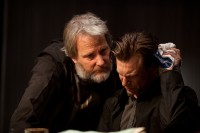 JEFF DANIELS (Abe) has been a professional stage and film actor for thirty six years. Raised in Michigan, Daniels attended Central Michigan University, majoring in English and minoring in theatre. When Marshall W. Mason arrived for a stint as a guest director at neighboring Eastern Michigan University, Daniels won the lead roles in Tennessee Williams‘ “Summer and Smoke” and Lanford Wilson’s “The Hot L Baltimore.” Mason was impressed with the 21 year old actor and invited him to join the Circle Repertory Company in New York.
JEFF DANIELS (Abe) has been a professional stage and film actor for thirty six years. Raised in Michigan, Daniels attended Central Michigan University, majoring in English and minoring in theatre. When Marshall W. Mason arrived for a stint as a guest director at neighboring Eastern Michigan University, Daniels won the lead roles in Tennessee Williams‘ “Summer and Smoke” and Lanford Wilson’s “The Hot L Baltimore.” Mason was impressed with the 21 year old actor and invited him to join the Circle Repertory Company in New York.
Dropping out of college in the fall of 1976, Daniels moved to New York. Mason immediately cast him in David Storey’s English family drama, “The Farm.” Soon after, he was understudying on Broadway in Albert Innaurato’s GEMINI and later performed in Lanford Wilson’s “Brontosaurus,” “Minnesota Moon,” and Corinne Jacker’s “My Life” with Christopher Reeve and William Hurt.
It was the role of Jed Jenkins in the New York production of Lanford Wilson’s “Fifth of July,” however, that won Daniels his first widespread recognition. Over the next several years, Daniels played Jed in three different productions: Off-Broadway at Circle Rep (1978), in Los Angeles at the Mark Taper Forum (1979) and finally on Broadway (1980) where he received a Drama Desk Nomination for Best Supporting Actor. Following the filming of “Fifth of July” for television, Daniels returned to Circle Rep to star in a one man show adaptation of Dalton’s Trumbo’s “Johnny Got His Gun,” for which he won a 1983 Obie Award. Other New York roles included “Three Sisters” at Manhattan Theatre Club, “Short Changed Review” and “Lemon Sky” (Drama Desk Nomination) at Second Stage and the Broadway production of A.R. Gurney’s “The Golden Age” with Stockard Channing and Irene Worth. Daniels starred on Broadway in Lanford Wilson’s “Redwood Curtain,” which played at San Diego’s Old Globe Theatre before moving to Broadway in the Spring of ‘93. Most recently, Daniels returned to the New York Stage and won a Drama League Award for his performance in Manhattan Theatre Club’s critically acclaimed “Blackbird.” After starring the Tommy Tune musical “The Turn of the Century” at Chicago’s Goodman Theatre (Fall, 2008). Daniels teamed up with James Gandolfini, Hope Davis, and Marcia Gay Harder in Mathew Warchus’ celebrated Broadway production of Yasmina Reza’s “God of Carnage” (Tony Nomination, Best Actor). After playing in the original Broadway Production for 256 straight performances, Daniels returned to the show in March of 2010 in the role originally played by James Gandolfini for another 112 performances, becoming one of five actors in Broadway history to “flip roles” in the same production.
On television, Daniels reprised his role in “Fifth of July” with co-star Richard Thomas for American Playhouse and Showtime, starred opposite Valerie Harper in “Invasion of Privacy,” with Brad Davis in “A Rumor of War,” Alan Arkin’s “The Visit” (written by Christopher Durang), Robert Altman’s “The Caine Mutiny Court-Martial,” “The Jackie Presser Story” with Brian Dennehy, Lee Grant’s “No Place Like Home” with Christine Lahti, and as George Washington in A&E’s film of “The Crossing” (2000), “Cheaters” (1995) for HBO, TNT’s remake of Neil Simon’s “The Goodbye Girl” (2003), Mitch Albom’s “The Five People You Meet in Heaven,” (2004), and “Sweet Nothing in My Ear” (2008) with Marlee Matlin. He currently stars in Aaron Sorkin’s “The Newsroom” for HBO.
Daniels made his feature film debut in Milos Forman’s Ragtime. His first popular success came with his next project, Terms of Endearment, as Debra Winger’s philandering husband. Next came two leading roles in Woody Allen’s The Purple Rose of Cairo. Working with Woody Allen was a turning point in Daniels career. So much so, he named his theatre company after the film. A listing of some of Daniels’ other film credits includes: Mike Nichols’ Heartburn (1986), Marie (1985), Jonathan Demme’s Something Wild (1986), Woody Allen’s Radio Days (1987), Peter Yates’ House on Carroll Street (1988), Checking Out (1989), Welcome Home, Roxy Carmichael (1990), The Butcher’s Wife (1991), Grand Tour (1992), Arachnophobia (1990), Gettysburg (1993), Speed (1994), Dumb & Dumber (1994), Fly Away Home (1996), 2 Days in the Valley (1996), 101 Dalmatians (1996), Trial and Error (1997), Pleasantville (1998), My Favorite Martian (1999), All the Rage (1999), Chasing Sleep (2000), Clint Eastwood’s Blood Work (2002), The Hours (2002), Gods and Generals (2003), I Witness (2003), Imaginary Heroes (2004), Because of Winn-Dixie (2004), RV (2005), Good Night, and Good Luck (2005), The Squid and the Whale (2005, Indie Spirit and Golden Globe Nominations, as well as Newsweek Magazine’s Choice for Best Actor of 2005), Infamous (2006), The Lookout (2006), Traitor (2008), State of Play (2008), Away We Go (2008), The Answer Man (2009), and Paper Man (2010).
In 1991, Daniels established the aforementioned Purple Rose Theatre Company, a not-for-profit professional theatre featuring Midwestern actors, directors, playwrights and designers. Located in the small town of Chelsea, Michigan, the 119 seat space (expanded to 168 seats in the spring of 2000) provides intimate surroundings, bringing the subtlety and detail of film acting to the stage. In nine years, the PRTC has gained a national reputation as a home for new American plays. Modeled after his days at New York’s Circle Repertory Company, the Purple Rose recently shared the American Critic Association’s 1998 Best New American Play with Lanford Wilson for his play, “Book of Days.” With the two year development of this play, commissioned by Daniels, and the subsequent World Premiere production by the Purple Rose (directed by PRTC Artistic Director Guy Sanville), the late Mr. Wilson received the award with Mr. Sanville in a ceremony at The Humana Festival for New American Plays in Louisville (March, 1999).
Daniels has written fifteen plays for the Purple Rose. His first play, “Shoe Man” (1991), won the Detroit News’ Best New Play Award. Daniels’ next comedy, “The Tropical Pickle” (1992), played to sold out audiences for seventeen consecutive weeks. “The Vast Difference” (1993) a comedy about men in the ‘90s ran for fourteen weeks before moving to Detroit’s Gem Theatre for a three month commercial run. “Thy Kingdom’s Coming” (1994), a biting satire about Hollywood and the Religious Right, ran for twelve weeks and was produced in New York by The Barrow Group (May, 1999). His other plays include “Apartment 3A” (1996 and produced in New York in 2006), “Boom Town” (1998), which Daniels also directed, “Norma & Wanda” (2005) which broke box office records at the Purple Rose, and “Guest Artist” (2006), winner of the Detroit Free Press Best New Play Award and nominated for Best New Play by the American Theatre Critics Association (Runner Up, his second nomination). “Across the Way” (2001) was his first nomination (Finalist) for ATCA’s Best New Play. In the Fall of 2006, the Purple Rose premiered “Escanaba in Love,” Daniels’ prequel and the second play of his “Escanaba Trilogy.” “Escanaba in Da Moonight,” a wild comedy set in an Upper Peninsula deer camp, sold out at the Purple Rose and Lansing’s Boarshead Theatre in both their initial productions (1995) and in the revival at both theatres (1997). Opening at Detroit’s Gem Theatre in September, 1999, “Moonlight” ran for sixteen straight months, setting the record as the longest running show in Detroit history. A critical and box office success, “Escanaba in Love” became the longest running show in PRTC history, performing from early October through the end of January 2007. His latest critically acclaimed play, “Panhandle Slim & The Oklahoma Kid,” features seven original songs by Daniels and played to sold out houses at the PRTC from late June through the end of September 2008. In the Fall of 2009, he completed his trilogy of plays about the Upper Peninsula with “Escanaba.” Following his fourteenth play, “Best of Friends” (2010), in the upcoming 2012-13 PRTC Season, Daniels will premiere his newest effort, “The Meaning of Almost Everything.”
In 1998, Daniels formed Purple Rose Films, a Michigan based production company as an outlet for his desire to act, write and direct his own independent films. He completed writing, directing and starring in the film, Escanaba in Da Moonlight, shot on location in Michigan’s Upper Peninsula in the Winter and Spring of 2000. Self distributed in Michigan in early 2001 (with a subsequent run in Wisconsin and Minneapolis-St.Paul), the film grossed $2.3 million, making it one of the top grossing independent films in the country that year. Daniels’ second writing, directing and acting venture, Super Sucker, was shot in Jackson, Michigan in the Spring of 2001. A wild comedy about door to door vacuum cleaner salesmen, the film won the Audience Award for Best Feature at the HBO sponsored U.S. Comedy Arts Festival in Aspen, CO, in February 2002.
As a singer/songwriter, Daniels played to sold out audiences in each of his two week runs at the Purple Rose Theatre. The ten straight years of annual performances of his one man show have raised almost $1million for the PRTC. Recording the PRTC shows, Daniels’ released a debut CD, “Jeff Daniels Live and Unplugged,” with all proceeds going to the Purple Rose. Available at www.jeffdaniels.com and iTunes, Daniels performed live on XM Radio’s THE VILLAGE (hosted by Christine Lavin), performed an original song live on the Country Music Television Awards in April, 2005, as well as playing across the country, including New York’s Birdland, Joe’s Pub, the City Winery, the Ram’s Head Tavern in Annapolis, MD, the Sheridan Opera House in Telluride, CO, the World Cafe in Philadelphia, The Barns at Wolf Trap in Vienna, VA, the Cactus Cafe in Austin, TX, and The Old School Of Folk Music in Chicago, IL. His other CDs include “Grandfather’s Hat,” “Together Again” with fellow Circle Rep actor Jonathan Hogan, “Live at the Purple Rose,” and “Keep It Right Here” with Brad Phillips and Dominic John Davis. In June 2012, acclaimed American guitar company C.F. Martin & Co. will unveil a new “Custom Artist Edition OM Jeff Daniels” acoustic guitar. Modeled after his 1934 C-2 Archtop Conversion – a model also played by James Cagney on movie sets in the ‘30s and ‘40s – Daniels and Martin’s Dick Boak spec’d out a modern day replica of that vintage model. Daniels is the first actor-musician since Gene Autry to receive such an honor from C.F. Martin & Co.
Daniels has received Honorary Doctorates from his alma mater, Central Michigan University, Albion College, and the University of Michigan. In 1991, Daniels received both the Detroit News’ Michiganian Of The Year Award and the prestigious Governor’s Michigan Artist Award. He was honored by the State Of Michigan with a House and Senate Resolution proclaiming October 4, 2000 “Jeff Daniels Day.”
 SUMMER QING (Old Joe’s Wife) is a native of Beijing, and graduated from Beijing Film Academy’s renowned performing division. She made an attention grabbing, feature film debut as the female lead in Chen Kaige’s 1990 Cannes Film Festival-competing Life on a String, about a pair of blind musicians in a rural village. Qing’s naturalistic performance contributed greatly to the film, which cemented Chen’s reputation as one of the foremost international filmmakers. Soon after, she played the lead for another acclaimed director, Lin Zifeng in his film Kuang (Crazy), and received a Best Actress nomination at one of China’s top film awards, the Hundred Flowers Awards. Then, the TV series “Close to Forbidden City” shot her to fame across the country as a sweet-natured ingénue.
SUMMER QING (Old Joe’s Wife) is a native of Beijing, and graduated from Beijing Film Academy’s renowned performing division. She made an attention grabbing, feature film debut as the female lead in Chen Kaige’s 1990 Cannes Film Festival-competing Life on a String, about a pair of blind musicians in a rural village. Qing’s naturalistic performance contributed greatly to the film, which cemented Chen’s reputation as one of the foremost international filmmakers. Soon after, she played the lead for another acclaimed director, Lin Zifeng in his film Kuang (Crazy), and received a Best Actress nomination at one of China’s top film awards, the Hundred Flowers Awards. Then, the TV series “Close to Forbidden City” shot her to fame across the country as a sweet-natured ingénue.
In 1996, she starred in the Chinese historical epic The Emperor’s Shadow, a fictionalized account of China’s first emperor and his relationship with a court musician. In official competition at the San Sebastian Film Festival, the film was widely recognized for its vast scope and breathtaking visuals. Qing’s leading men were Ge You, one of China’s most popular actors today, and Jiang Wen, the internationally renowned actor and director. Testament to her popularity was Disney’s choice to have her voice the part of Mulan, an important Chinese folk figure, in the dubbed Chinese version of their 1998 worldwide hit animated movie. That period also saw her play memorable parts in such TV series as “Sun Rise in the East, Rain in the West” and “Coming and Going.” Most Chinese TV audiences remember her from the 2000 big-budget China Central Television landmark production of “Laughing in the Wind (The Legendary Swordsman),” based on a popular martial arts novel by Louis Cha.
She continued to play regularly in films and TV series over the course of the next decade. In 2007, she was featured in the Hong Kong action movie Flash Point, a box-office hit across Asia. Most memorably, she played the pivotal part of Song Qingling, wife of Sun Yat-sen and an honored historical figure known to every Chinese person, in the hugely successful 2009 film The Founding of a Republic. For that role, she won a Hundred Flowers Award for Best Supporting Actress. She won the same prize at the Macau International Film Festival. Qing can currently be seen in the epic Chinese historical drama Final Testament (To My Wife), one of the most anticipated Chinese films of 2012.
ABOUT THE FILMMAKERS
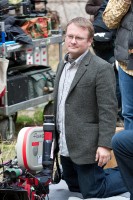 Since his stylized breakout directorial debut, RIAN JOHNSON (Writer-Director) has become internationally known for crafting films with their own artfully designed voice and look, and for telling unique stories that blend the pulp of genre with a genuine soulfulness.
Since his stylized breakout directorial debut, RIAN JOHNSON (Writer-Director) has become internationally known for crafting films with their own artfully designed voice and look, and for telling unique stories that blend the pulp of genre with a genuine soulfulness.
Johnson released his sophomore feature The Brothers Bloom, starring Adrien Brody, Rachel Weisz, and Mark Ruffalo, in 2008. Johnson both wrote and directed the screenplay, which he describes as “A con man movie that’s ultimately about how we all use storytelling, for good and ill, in our lives.” Bloom follows two brothers, played by Brody and Ruffalo, who travel the world conning society’s elite. They lead a successful enterprise until their last target, a beautiful heiress (Weisz), offers an unexpected and romantic twist.
His first feature, Brick, brought the director international acclaim. This dark, moody mystery was a surprise hit when it premiered at the Sundance Film Festival in 2005. Made on a micro budget and funded by family and friends, the film follows Joseph Gordon-Levitt as a loner high school student as he digs through his small town’s criminal underbelly in search of his ex-girlfriend’s killer. A clever, sincere modern take on classic detective fiction, the film was nominated for a host of awards, including several film critics associations and two Independent Spirit Awards. The film also won the Special Jury Prize at Sundance.
Johnson grew up making homespun movies with his friends, and through that early education he developed a love for all aspects of filmmaking. Johnson sought formal education at the University of Southern California’s School of Cinematic Arts. He is currently locked in his producer’s root cellar until he finishes the script for his next movie.
RAM BERGMAN (Producer) previously collaborated with Looper writer-director Rian Johnson on The Brothers Bloom, starring Adrien Brody, Rachel Weisz, Mark Ruffalo, and Rinko Kakuchi, and Brick, starring Joseph Gordon-Levitt. Bergman is currently in post-production on Don Jon’s Addiction, which marks the directorial debut of Joseph Gordon-Levitt, and stars him alongside Scarlett Johansson and Julianne Moore.
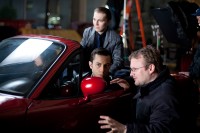 Bergman was nominated for the Producer Award at the 2006 Film Independent’s Spirit Awards, and was named one of the Ten Producers to Watch by Variety in 2005.
Bergman was nominated for the Producer Award at the 2006 Film Independent’s Spirit Awards, and was named one of the Ten Producers to Watch by Variety in 2005.
JAMES D. STERN (Producer) is the Chairman and Chief Executive Officer of Endgame Entertainment. He founded Endgame as a private entertainment financing and production fund in 2003. During its first iteration, Endgame specialized in production, financing of third party projects, and late stage financial investments. In 2006, due to the success of the first fund, Endgame raised additional capital and became an operating company with an increased focus on full scale production. Since its inception, Endgame has financed or co-financed more than 30 films, several Broadway shows, and various other entertainment properties.
An award-winning theatrical producer, filmmaker, and CEO of Endgame Entertainment, Stern has produced over 50 films and shows. In film, Stern most recently produced Steven Soderbergh’s Side Effects, starring Rooney Mara, Channing Tatum and Jude Law, set to be released in 2013. Other films which span a wide range of genres include Hotel Rwanda, I’m Not There, The Brothers Bloom, Lord of War, Harold and Kumar Go to White Castle, and the Oscar®-nominated An Education. Stern has also directed a number of films, including the Oscar® short-listed documentary Every Little Step, …So Goes the Nation, The Year of the Yao, and Michael Jordan to the Max, and the HBO feature “It’s the Rage.” In television, Stern is co-directing the 10 part documentary series “Sport in America: Our Defining Stories,” set to air on HBO in 2013. Additionally, his many Broadway credits include Tony® winning musicals “The Producers” and “Hairspray,” Tony® nominated “Legally Blonde,” “A Little Night Music,” and the international hit “Stomp.”
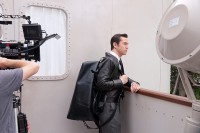 In addition to his producing and directing career, Stern founded and ran the company Stern Joint Venture, L.P. (“SJV”), a “fund of funds.” During his decade long tenure, Stern Joint Venture Company compounded an annual rate of return of 19.75% beginning in 1991 through 2001. Mr. Stern has a B.A. in directing from the University of Michigan and an MBA in marketing and finance from Columbia University.
In addition to his producing and directing career, Stern founded and ran the company Stern Joint Venture, L.P. (“SJV”), a “fund of funds.” During his decade long tenure, Stern Joint Venture Company compounded an annual rate of return of 19.75% beginning in 1991 through 2001. Mr. Stern has a B.A. in directing from the University of Michigan and an MBA in marketing and finance from Columbia University.
DOUGLAS E. HANSEN (Executive Producer) serves as the President of the Endgame Entertainment Company as well as the Chief Executive Officer of Endgame Releasing Company, which provides Prints and Advertising funding for the major and mini-major studios. Hansen has primary responsibility for sourcing, structuring and negotiating the company’s investments and financing. Hansen has been a financier and adviser to the entertainment industry for 25 years. Prior to the founding of Endgame with James D. Stern in 2002, Hansen oversaw the financing of more than 150 individual film productions, totaling more than $2.0 billion of financing, and managed capital commitments of more than $4.0 billion for Banks active in financing Entertainment. From 1999 until 2002, Hansen was Senior Vice President and Managing Director of Corporate Finance for the Entertainment Finance Division of Union Bank of California. During this time period, Hansen was involved in production financing and commitments to a broad range of entertainment companies, distributors and producers. From 1991-1999, Hansen was Director-Manager of the Entertainment Finance Group of Banque Paribas, providing film and television production financing to the major studios and independent producers. Prior to Banque Paribas, Hansen worked for Bank of America’s Entertainment Industries Group. Hansen has a B.A. in Economics from Stanford University and an M.B.A. from the Anderson School of Management at UCLA.
JULIE GOLDSTEIN (Executive Producer) is President of Production at Endgame Entertainment, responsible for all aspects of development and production of film and television. She is currently overseeing the company’s involvement in Steven Soderbergh’s Side Effects.
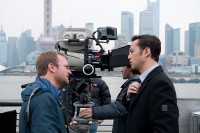 During her previous role as Senior Vice President, HBO Films, she produced the Emmy and Golden Globe Award winner Grey Gardens for the channel as well as the critically acclaimed feature Kit Kittredge: An American Girl, among others.
During her previous role as Senior Vice President, HBO Films, she produced the Emmy and Golden Globe Award winner Grey Gardens for the channel as well as the critically acclaimed feature Kit Kittredge: An American Girl, among others.
Goldstein spent much of her career at Miramax Films working on an extensive list of admired and honored films including: Best Picture Academy Award® winners Chicago and Shakespeare in Love, Academy Award® winner Finding Neverland, Academy Award® nominees Bridget Jones’ Diary, An Ideal Husband, Dirty Pretty Things and Emma, and Golden-Globe nominee Proof. Her credits also include such successful films as Serendipity, Shall We Dance and Ella Enchanted. Goldstein is the recipient of two Screen Actors Guild Honor Awards, a Golden Laurel Award from the Producers Guild of America and a Humanitas Prize.
PETER SCHLESSEL (Executive Producer) has had a varied and entrepreneurial career in the entertainment industry. He currently is CEO of FilmDistrict, which acquired Looper at Cannes in 2011. FilmDistrict’s initial successes have included Insidious, Soul Surfer, Drive and Safety Not Guaranteed and the slate includes the upcoming Looper, Red Dawn, Playing for Keeps, Parker, Evil Dead and Dead Man Down, a number of which he is serving as an Executive Producer.
Schlessel started his career at Sony Pictures Entertainment (“SPE”) in 1989 as Director of Legal Affairs for RCA/Columbia Home Video. He was subsequently VP of Business Affairs, SVP of Acquisitions and Business Affairs and EVP of Acquisitions and Co-Productions. In 1996, he co-founded Screen Gems, which was set up to finance and produce genre, mid-range budgeted pictures. During his tenure at SPE he supervised over 1500 third-party acquisitions. Under Schlessel’s supervision, revenue grew tenfold for the acquisition and co-production lines of business. In 2000, Schlessel was promoted to President of Production for Columbia Pictures. In the three years he was President of Production, Columbia’s box office rank rose from #8 in 2000 to #1 in 2002 (setting a then industry record of $1.57 billion). In the beginning of 2003, Schlessel was promoted to President of Columbia Pictures. While President, he was involved in Columbia’s summer hits Spiderman, Charlie’s Angels and SWAT. Internationally, he spearheaded Columbia’s acquisition of T3: Rise of the Machines and Terminator: Salvation.
In 2004, Schlessel left Sony to consult for a number of different companies including Dreamworks and Mandate Pictures. He also assisted Jeff Skoll in founding Participant Productions. As a Producer he was involved with Stay Alive, Prey and the Possession.
Schlessel returned to SPE in 2006 as the President of Worldwide Acquisitions, before being promoted to President of Worldwide Affairs. He was responsible for SPE’s involvement in such pictures as District 9 and Michael Jackson’s This Is It. SPE’s release of GK Film’s The Tourist and the upcoming Jersey Boys were under an output deal that Schlessel initiated. He also oversaw the SPE’s Lot Project which included the construction of two office towers, a new commissary, athletic club and park.
Schlessel is a graduate of Union College in Schenectady, NY and the University of Pennsylvania Law School.
DAN MINTZ (Executive Producer), an award-winning director, is Founder and CEO of DMG, which owns and operates the premier entertainment company DMG Entertainment, and a leading communications agency, DMG Media. Foreseeing the growth of China, Mintz, along with partners Peter Xiao and Wu Bing, established DMG in 1993 on a visionary and pioneering platform that has been revolutionizing multiple industries by synergistically fusing the worlds of entertainment and media.
As CEO of DMG, Mintz is the innovation engine behind the company. He has done everything from directing and producing to advertising and marketing, bringing success to a strong portfolio of global companies, including Universal, Sony, Lionsgate, Summit, Volkswagen, Nike, Under Armour, NBA, Johnson & Johnson, and China Mobile. Under Dan’s leadership, DMG Entertainment is pioneering the Chinese entertainment industry, introducing and developing a Hollywood/China film studio model for China. With such vision, DMG Entertainment has achieved trailblazing success with a proven track record of producing China’s #1 films, The Founding of a Republic, Go Lala Go!, and Beginning of the Great Revival, and distributing Hollywood hits Twilight, Knowing, Killers, Resident Evil: Afterlife 3D, Red, The Eagle, and Priest.
STEVE YEDLIN (Director of Photography) has collaborated with Rian Johnson on both of his previous films: Brick, which starred Joseph Gordon-Levitt, and The Brothers Bloom, which starred Rachel Weisz, Mark Ruffalo, and Adrien Brody, and was filmed all over Eastern Europe. Brick enjoyed universal critical acclaim; the second film Yedlin photographed to debut at the Sundance Film Festival, Brick won the Special Jury Prize for Originality of Vision. It was also nominated for the John Cassavetes Award at the Independent Spirit Awards and for the Grand Special Prize at the Deauville Film Festival. Yedlin also shot another Sundance premiere– Lucky McKee’s May (in 2002).
The Witness: From the Balcony of Room 306, a documentary short that Yedlin had the honor of shooting, was nominated for an Academy Award® in 2009 .
Yedlin is currently shooting MGM’s remake of Carrie, starring Chloe Moretz. He recently wrapped Imogene, starring Annette Bening, directed by Robert Pulcini & Shari Springer Berman. He also shot Love & Other Impossible Pursuits starring Natalie Portman, American Violet with director Tim Disney and Lovely By Surprise with director Kirt Gunn, starring Carrie Preston.
ED VERREAUX (Production Designer) attended the San Francisco Art Institute, where he studied fine art, painting, printmaking, and doodling. His first film job was working as an apprentice animator with the legendary Chuck Jones, who was doing such animated TV specials as “The Grinch Who Stole Christmas” and “Horton Hears a Who.” He also worked on Winds of Change, an animated feature, and freelanced at Hanna-Barbera and other animation studios, working on Saturday morning television programs.
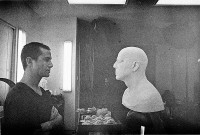 Joining Robert Abel & Associates, Verreaux got the chance to help the company create the special effects for Star Trek: The Motion Picture, working not only on animation but conceptual illustrations, set design, and storyboarding.
Joining Robert Abel & Associates, Verreaux got the chance to help the company create the special effects for Star Trek: The Motion Picture, working not only on animation but conceptual illustrations, set design, and storyboarding.
Verreaux went on to work with Steven Spielberg, doing storyboards for the films Raiders of the Lost Ark, E.T., Poltergeist, and The Twilight Zone. He went on to work with Spielberg on such films as Indiana Jones and the Temple of Doom and Indiana Jones and the Last Crusade, The Color Purple, Empire of the Sun, and Back to the Future Parts II and III. Meeting director George Miller through his work on The Twilight Zone, Verreaux spent a year in Australia working on Mad Max Beyond Thunderdome.
Transitioning to art direction, Verreaux’s credits include Honey, I Blew Up the Baby, The Distinguished Gentleman, Casper, and How to Make an American Quilt. His first credit as a production designer was for Robert Zemeckis on Contact, which allowed Verreaux to collaborate with Carl Sagan in concept meetings.
His many other credits include Mission to Mars, Jurassic Park III, The Scorpion King, the animated film Monster House, X-Men 3, Rush Hour 3, and GI Joe: The Rise of Cobra.
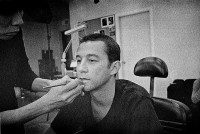 BOB DUCSAY is an editor and producer whose editing credits include Jack the Giant Killer, G.I. JOE: The Rise of Cobra, Van Helsing, The Mummy, The Mummy Returns, Impostor, Love and a .45, The Jungle Book and The Adventures of Huck Finn.
BOB DUCSAY is an editor and producer whose editing credits include Jack the Giant Killer, G.I. JOE: The Rise of Cobra, Van Helsing, The Mummy, The Mummy Returns, Impostor, Love and a .45, The Jungle Book and The Adventures of Huck Finn.
His producing credits include G.I. JOE: The Rise of Cobra, The Mummy: Tomb of the Dragon Emperor, Van Helsing, The Mummy Returns and the Academy Award®-winning short Two Soldiers. He is also the co-writer of Vegas Vacation.
Ducsay received a BA from the University of Pennsylvania and an MFA from the
University of Southern California School of Cinematic Arts.
SHAREN DAVIS (Costume Designer) has twice been nominated for the Academy Award®— first for Ray in 2004 and then for Dreamgirls in 2006. She is a frequent collaborator with actor Denzel Washington, having worked with him on five films, most recently on the post-apocalyptic The Book of Eli. Her work was most recently seen in The Help and will next be seen in Quentin Tarantino’s Django Unchained.
Davis’ other credits include Middle Men, Seven Pounds, The Great Debaters, The Pursuit of Happyness, Akeelah and the Bee, Beauty Shop, Out of Time, Antwone Fisher, High Crimes, Double Take, Nutty Professor II: The Klumps, Rush Hour, Doctor Dolittle, Money Talks, Devil in a Blue Dress, “Earth 2” (TV series), Younger and Younger, and “Equinox.”
As a composer, producer, art director, and songwriter, NATHAN JOHNSON’s (Music) innovative film scores and hybrid media performances have consistently blurred the lines between stage, screen, music, and narrative. Best known for his unconventional work in film and music, Johnson favors modified, organic instrumentation combined with unique approaches to recording and performing.
His creative partnership with writer/director (and cousin) Rian Johnson started when the two were children and has continued throughout their professional lives. Beginning with the critically acclaimed score for their first feature collaboration, Brick, Nathan and his team used and abused a variety of household implements, including dinner settings, filing cabinets, cheese graters, and radiators. Any real instruments that were included in the soundtrack were horribly misused: pianos were bolted and tacked, double basses were beaten with mallets, and tuned wine glasses were re-purposed in place of a string section. After developing this “junkyard orchestra,” Johnson went on to produce and compose the scores for The Brothers Bloom, Joseph Gordon-Levitt’s Morgan M. Morgansen series, and the Mélanie Laurent feature, The Day I Saw Your Heart, among others.
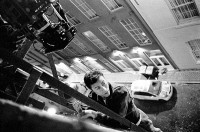 Looper is perhaps his most unique score to date, featuring a host of indecipherable instruments along with intertwining rhythms and textures. In preparation for the project, Johnson began gathering a wide range of field recordings and then he and his team created a sort of playable, hybrid found-sound orchestra using those original recordings. The results were combined with live strings and horns to produce deep textures featuring pitched industrial fans, tuned treadmills, and a wide range of intricate rhythmic elements — all looping and cycling on themselves at various speeds.
Looper is perhaps his most unique score to date, featuring a host of indecipherable instruments along with intertwining rhythms and textures. In preparation for the project, Johnson began gathering a wide range of field recordings and then he and his team created a sort of playable, hybrid found-sound orchestra using those original recordings. The results were combined with live strings and horns to produce deep textures featuring pitched industrial fans, tuned treadmills, and a wide range of intricate rhythmic elements — all looping and cycling on themselves at various speeds.
Johnson continues to compose and produce while fronting The Cinematic Underground, a sprawling artistic collective known for mixing visual art with performance and found-sounds. He is part of the atmospheric pop band Faux Fix, and has produced a variety of independent artists while acting as a concert developer and live show consultant for a number of bands. When he is not creating music, he works as an art director with The Made Shop, a boutique design firm that specializes in graphic and architectural projects. He divides his time between Los Angeles and the East coast and lives outside of New York.
“ACADEMY AWARD®” and “OSCAR®” are the registered trademarks and service marks of the Academy of Motion Picture Arts and Sciences.”
